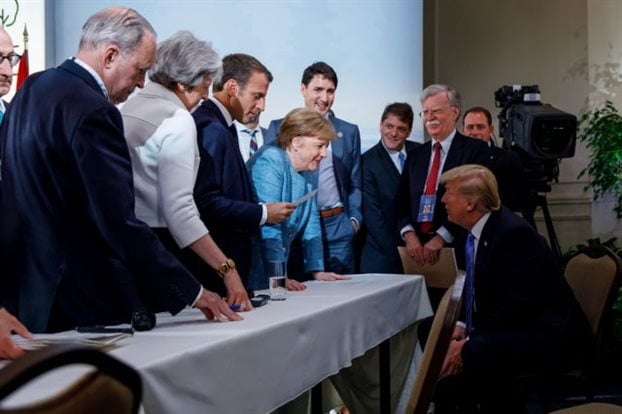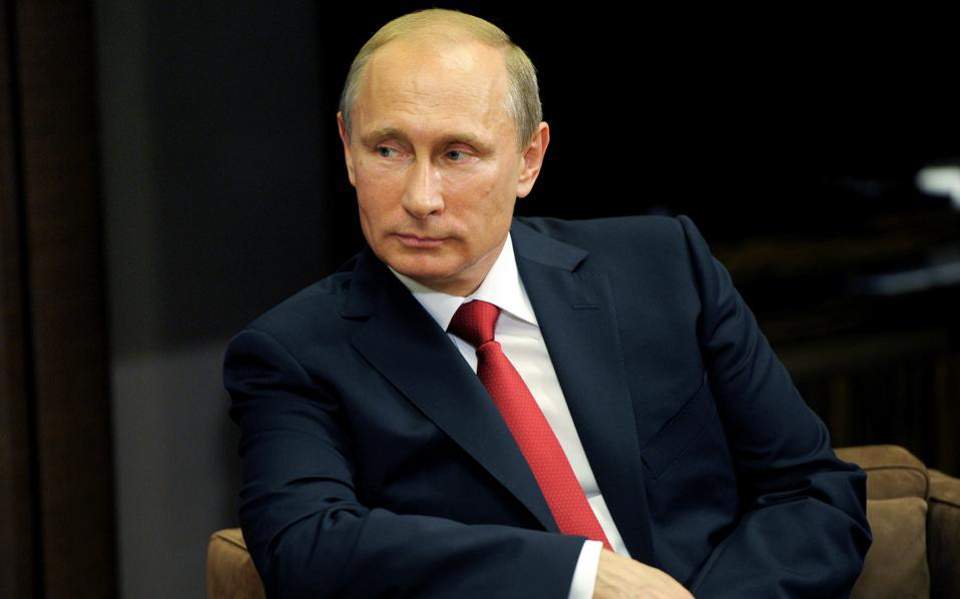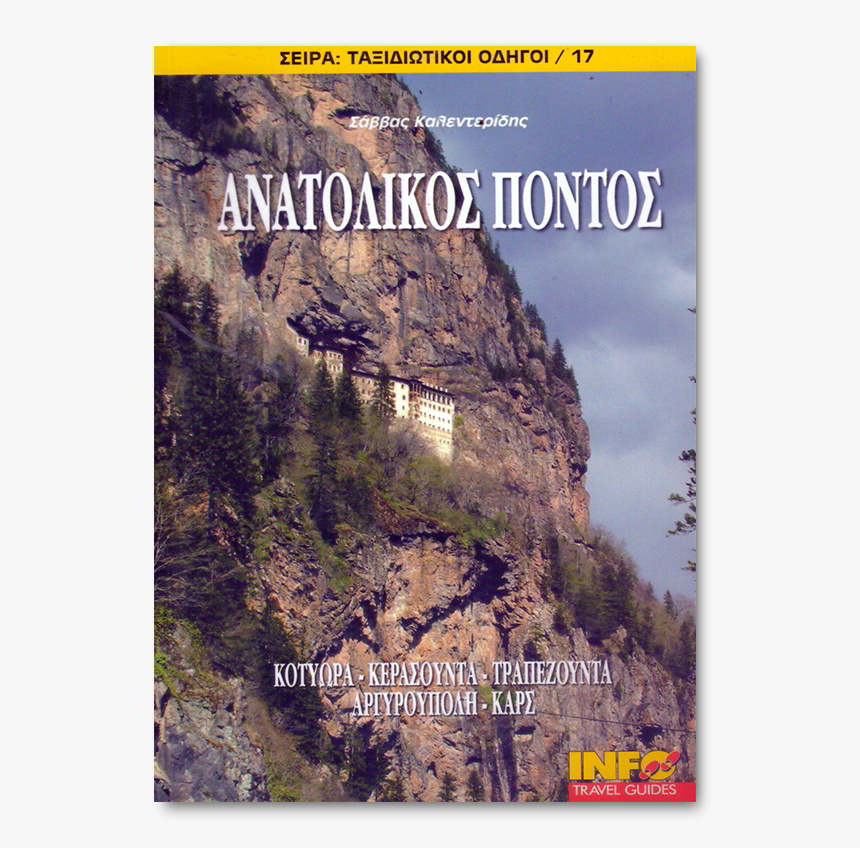G-7
Έμφαση στα διεθνή ζητήματα από τη G8

Ο αποκλεισμός της Λωρίδας της Γάζας από το Ισραήλ, η Βόρεια Κορέα, το Αφγανικό και το πυρηνικό πρόγραμμα του Ιράν ήταν μεταξύ των διεθνών ζητημάτων που απασχόλησαν την ομάδα των Οκτώ πιο βιομηχανικών χωρών κατά τις εργασίες της ετήσιας συνόδου κορυφής που πραγματοποίησε στο Χάντσβιλ του Καναδά.
Στην τελική ανακοίνωσή τους που δόθηκε το Σάββατο στη δημοσιότητα οι ηγέτες της ομάδας τάχθηκαν κατά του αποκλεισμού της Λωρίδας της Γάζας.
“Οι σημερινές ρυθμίσεις δεν είναι βιώσιμες και πρέπει να αλλάξουν”, επισημαίνεται στην τελική ανακοίνωση της G8 σε αναφορά στον αποκλεισμό που έχει επιβληθεί από το Ισραήλ στη Λωρίδα της Γάζας.
“Ζητούμε επίμονα από όλες τις πλευρές να εργαστούν από κοινού για να υλοποιηθεί η απόφαση 1860 του Συμβουλίου Ασφαλείας του ΟΗΕ και για να διασφαλιστεί η ανθρωπιστική βοήθεια και η μεταφορά εμπορικών αγαθών και η μετακίνηση ανθρώπων από και προς τη Γάζα”, προσθέτουν οι ηγέτες της G8 στην ανακοίνωσή τους.
“Εκφράζουμε τη βαθύτατη λύπη μας για τους βίαιους θανάτους και τους τραυματισμούς που προκλήθηκαν στη διάρκεια των γεγονότων που σημειώθηκαν στις 31 Μαΐου στα ανοιχτά της Γάζας”, επισημαίνουν επίσης οι ηγέτες της G8 στο κείμενο αυτό, στο οποίο εκφράζουν ωστόσο την ικανοποίησή τους για “την απόφαση που πήρε η ισραηλινή κυβέρνηση να δημιουργήσει μια δημόσια ανεξάρτητη επιτροπή για να διερευνήσει για τα γεγονότα αυτά, με μια διεθνή συμμετοχή”.
Από την επίθεση καταδρομέων του ισραηλινού πολεμικού ναυτικού στον διεθνή ανθρωπιστικό στολίσκο με τη βοήθεια για τη Γάζα έχασαν τη ζωή τους 9 άνθρωποι μεταξύ των επιβατών.
Η G8 καταδικάζει την Πιονγιάνγκ
Περαιτέρω, οι ηγέτες της καταδικάζουν τη Βόρεια Κορέα για τη βύθιση μιας νοτιοκορεατικής κορβέτας το Μάρτιο, σύμφωνα με την τελική ανακοίνωσή τους που δόθηκε σήμερα στη δημοσιότητα στο τέλος της ετήσιας συνόδου κορυφής που πραγματοποίησαν στο Χάντσβιλ, 200 χιλιόμετρα βόρεια του Τορόντο του Καναδά.
“Εκφράζουμε τη λύπη μας για το περιστατικό της 26ης Μαρτίου που προκάλεσε το ναυάγιο του πλοίου Cheonan της Δημοκρατίας της Κορέας και το θάνατο 46 ανθρώπων”, σημειώνουν οι αρχηγοί κρατών και κυβερνήσεων της G8 στην τελική ανακοίνωσή τους.
“Η κοινή πολιτική και στρατιωτική ομάδα έρευνας υπό τη διεύθυνση της Δημοκρατίας της Κορέας με τη συμμετοχή ξένων ειδικών κατέληξε στην ευθύνη της Λαϊκής Δημοκρατίας της Κορέας για το ναυάγιο του Cheonan”, υπενθυμίζουν.
“Υπό αυτές τις συνθήκες καταδικάζουμε την επίθεση που προκάλεσε το ναυάγιο του Cheonan”, καταλήγουν και ζητούν από τη Βόρεια Κορέα “να απέχει από οποιαδήποτε επίθεση ή οποιαδήποτε εχθρική απειλή” κατά της Νότιας Κορέας.
Κάλεσμα για διάλογο στην Τεχεράνη
Τέλος, οι ηγέτες της Ομάδας των Οκτώ καλούν το Ιράν σε έναν “διάλογο με διαφάνεια” για το πυρηνικό του πρόγραμμα και να σεβαστεί το “κράτος δικαίου” και την “ελευθερία της έκφρασης”.
“Αναγνωρίζοντας στο Ιράν το δικαίωμα σε ένα πυρηνικό πρόγραμμα για ειρηνικούς σκοπούς (…) ανησυχούμε έντονα για την απουσία διαφάνειας από το Ιράν όσον αφορά τις πυρηνικές του δραστηριότητες και για τη δεδηλωμένη πρόθεσή του να συνεχίσει και να εξελίξει τον εμπλουτισμό ουρανίου, συμπεριλαμβανομένου σε ποσοστό σχεδόν 20%”, σημειώνουν.
“Ζητούμε επίμονα από την ιρανική κυβέρνηση να σεβαστεί το κράτος δικαίου και την ελευθερία της έκφρασης όπως προβλέπουν οι διεθνείς συνθήκες” τις οποίες έχει προσυπογράψει, καταλήγουν.
Για το ζήτημα του Αφγανιστάν η G8, αναφέρει ότι οι αφγανικές δυνάμεις οφείλουν να σημειώσουν συγκεκριμένη πρόοδο εντός 5 ετών ώστε να αναλάβουν περισσότερες ευθύνες για την εγγύηση της ασφάλειας της χώρας τους.
Οι χώρες της Ομάδας των Οκτώ δεσμεύτηκαν επίσης να αγωνιστούν κατά της τρομοκρατίας μέσω μιας “ακέραιης και συντονισμένης δράσης” που θα οφελήσει κυρίως χώρες ή περιοχές που κρίνονται ευάλωτες όπως το Αφγανιστάν, το Πακιστάν, η περιοχή του Σαχέλ (τα κράτη νότια της Σαχάρας), η Σομαλία και η Υεμένη.
Τέλος, η Γαλλία, η Ρωσία και οι ΗΠΑ τάχθηκαν υπέρ μιας “ειρηνικής λύσης” στη σύγκρουση για τον θύλακα του Ναγκόρνο-Καραμπάχ, της περιοχής αυτής του Αζερμπαϊτζάν.
SKAI.GR

G-7
Strengthening Global Diplomacy: PM Modi’s exemplary engagement at G7 summit in Japan
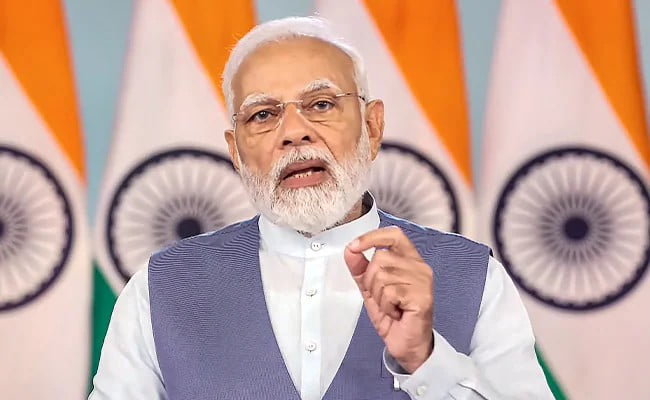
The global stage is witnessing a remarkable shift in India’s international diplomacy as Prime Minister Narendra Modi embarked on a momentous five-day visit to three countries, which commenced on May 19.
This exceptional journey witnesses his active participation in three significant multilateral summit meetings held in Japan, Papua New Guinea, and Australia respectively. Notably, the Prime Minister’s visit to Hiroshima, Japan for the G7 summit, from May 19 to 21, is a testament to India’s growing global influence. During this summit, Prime Minister Modi’s interventions addressed a broad horizon of themes including the pursuit of peace, stability, and prosperity for a sustainable planet, as well as addressing critical concerns of food, fertilizer, and energy security.
India was one of the invitees to the G7 summit, along with Australia, the Cook Islands, Brazil, Vietnam, Indonesia and others. The invitation was extended during the visit of the Japanese Prime Minister to India in March 2023. Earlier in 2019, India was invited by France, which hosted the G7 summit that year. USA had invited India in 2020 but the summit meeting that year was cancelled on account of the COVID-19 pandemic. It appears India has become a permanent guest for the G7 summits.
The Group of Seven (G7) is an informal group of seven developed countries — the United States, Canada, France, Germany, Italy, the United Kingdom and Japan, the heads of which attend an annual summit with the European Union and other invitees. It came into being in the 1970s, in response to huge economic problems such as the first oil shock and the collapse of the Bretton Woods fixed exchange rate system. The heads of state and government required an international platform to explore how to calibrate international economic policies and institutions to cope with their effects.
French President Valery Giscard d’Estaing and Chancellor Helmut Schmidt of Germany played the leading roles behind the organization of the first summit meeting in 1975, at the Chateau de Rambouillet, 50 kilometres south-west of Paris. At the summit the heads of state and governments of France, West Germany, the USA, Japan, the United Kingdom and Italy explored the implications of the oil shock, the financial crisis and the ways out of recession. Canada joined in 1976, leading to the group being named as G7. Talks between the G7 and the European Community were held for the first time in 1977. Russia was invited to join the group in 1998 which was renamed G8. However, when Russia’s membership was annulled in 2014 when it annexed Crimea from Ukraine.
The members represent 40% of the global GDP and 10% of the world’s population. However, the G7 has no legal existence, permanent secretariat or official members. Its resolutions have no binding impact on policy and commitments made at G7 must be ratified independently by the member states.
The G7 summit meetings initially focused on international economic policy, but the member countries gradually expanded their mandate. The group began discussing foreign policy and security issues in the 1980s. More recently, G7 leaders have met to formulate shared responses to challenges involving counterterrorism, development, education, health, human rights and climate change.
The G7 Summits have seen the launch of several global initiatives. In 1997, the G7 countries decided to support efforts to contain the effects of the reactor meltdown in Chernobyl with a USD 300 million corpus. Members launched a coordinated response to fight the threat of AIDS, Tuberculosis and Malaria at the 2002 summit. The Global Fund, an innovative financing arrangement that has distributed more than USD 45 billion in aid and saved the lives of over 38 million people, thus came into being. More recently, the Global Apollo Program was launched in the 2015 G7 summit meeting. It is designed to tackle climate change through clean energy research and development. The Apollo Program had been conceived by the UK but picked up momentum only after the other G7 countries came on board. The programme requires developed nations to commit to spending 0.02% of their GDP on tackling climate change for a ten-year period between 2015 and 2025, an amount that would total USD 150 billion. In 2021, the grouping committed to sharing at least 1 billion Coronavirus vaccine shots with the world. Half of them were to come from the US and 100 million from the UK.
The G7 has also faced strong criticism for the disproportionate influence of its members and the secrecy of its meetings. There was a strong international backlash in the mid-1980s, when its members signed the Plaza Accords which had major ramifications in the international currency markets. G7 has since then announced the dates of its summits well in advance so that international markets can make the necessary adjustments. Some nations still see it as an exclusive club with disproportionate influence on the global markets. Almost all G7 summit meetings since 2000 have seen protesters carrying out demonstrations in cities where they were held.
G7 meetings have been marked by major controversies in recent years. In 2015, Donald Trump refused to recommit the USA to the 2015 Paris Climate Agreement on the eve of the 2017 G7 summit. The member countries retaliated by leaving the USA out of the joint communique released after the meeting. Trump caused another controversy in 2018 when he refused to endorse the joint communique on the ground that an observation by Canadian Premier Trudeau during a press conference had offended him. Earlier, he had asked for Russia to be reinstated, a proposal which other members rejected. The grouping has also faced criticism for not including India and China despite their growing influence.
This year, premiers of seven of the world’s most influential democracies met in Hiroshima, where the first atomic attack took place at the end of World War II, for a three-day annual summit between 19 and 21 May.
Hiroshima is incidentally the home town of Japanese Prime Minister Khishida. The choice of venue probably underscored a determination to foreground nuclear disarmament and non-proliferation in the agenda. Nuclear disarmament appeared more difficult than ever, given Russia’s recent nuclear weapon threats in Ukraine, and China and North Korea going steadily ahead with nuclear and missile development. G7 leaders were also expected to condemn Russia’s war on Ukraine. China’s escalating threats to Taiwan were also expected to form part of the discussions.
The main issues discussed during the summit this year did include nuclear disarmament and Russia’s war on Ukraine, along with the global economy, finance and sustainable development, climate change, environment and energy and food security and health.
Condemning Russia’s ‘war of aggression’ on Ukraine in the ‘strongest possible terms, the leaders resolved to support Ukraine for as long as it takes. They committed themselves to non-proliferation and disarmament efforts towards the ultimate goal of a world without nuclear weapons. They agreed to coordinate their approaches to economic resilience and security through deeper and more diversified partnerships and lead the transition to clean energy economies through cooperation within and beyond G7. Finally, they launched Hiroshima Action Statement for Resilient Global Food Security and Partnership for Global Infrastructural Investment (PGII) to deliver on the target of mobilizing up to USD 600 to finance quality infrastructure.
Prime Minister Modi landed in Hiroshima on May 19 to join the G7 proceedings and hold bilateral meetings on the sidelines with several world leaders. He unveiled a bust of Mahatma Gandhi in Hiroshima. Crafted and sculpted by Padma Bhushan awardee Ram Vanji Sutar, the 42-inch-tall bronze bust was gifted as a symbol of friendship and goodwill between India and Japan. It has been installed close to the iconic Atomic Bomb Dome in a befitting tribute to a city that symbolizes humanity’s yearning for peace. Speaking to reporters after the event, the Prime Minister emphasized the global appeal of Gandhian ideals of peace and non-violence, observing that it gave strength to millions.
Addressing a G7 working session on food, health, development and gender, Prime Minister Modi called for building an inclusive food system focusing on the world’s most vulnerable people, especially marginal farmers, and strengthening global fertilizer supply chains on a priority basis. He also called for greater health security in future, through hard-wearing healthcare systems and greater attention to holistic healthcare. Speaking on the development, he stressed the democratization of technology as a bridge between democracy and development. Finally, on the gender question, the Prime Minister observed that it has been made an integral part of the decision and policy-making process in India.
Prime Minister held a meeting with Volodymyr Zelenskyy, President of Ukraine on the sidelines of the G7 Summit. He observed that for him the conflict in Ukraine was not merely a political or economic issue but an issue of humanity, of human values. Appreciating Ukraine’s cooperation in the safe evacuation of Indian students, Prime Minister Modi conveyed India’s unwavering support for dialogue and diplomacy as a way forward, promising that India and Prime Minister personally would do everything within their means to find a solution to the problem.
Modi later held a warm productive conversation with Japanese premier Fumio Kishida on Saturday, May 19. The two leaders explored various ways to coordinate various efforts of respective G7 and G20 Presidencies, with the objective of highlighting the voice of the Global South. They also exchanged views on contemporary regional developments and on deepening cooperation in the Indo-Pacific.
Modi later met South Korean President Yoon Suk Yeol. The two premiers discussed the progress of the India-Republic of Korea Special Strategic Partnership, exploring strategies to strengthen bilateral cooperation across sectors, including high technology, IT hardware manufacturing, trade and investment, defence, semiconductors, and culture.
Prime Minister Modi also met Pham Minh Chinh, the Prime Minister of Vietnam. They were happy with the steady progress of the bilateral Comprehensive Strategic Partnership, ageing to increase high-level exchanges and deepen bilateral trade and investment ties. They also explored prospects in the sectors of defence, energy, science and technology, building resilient supply chains, culture, human resource development, and people-to-people ties. They had a positive exchange of views on regional developments, such as the ASEAN and cooperation in the Indo-Pacific.
Prime Minister Modi met Luiz Inacio Lula da Silva, President of Brazil, on 21 May in what was the first meeting between the two leaders. Noting that this year marked the 75th anniversary year of the establishment of diplomatic relations, they reviewed their Strategic Partnership and discussed ways to further strengthen it, especially in sectors of defence production, trade, agriculture, pharmaceuticals, dairyanimal husbandry and bio-fuels and clean energy. Both leaders called for more high-level meeting among captains of industry from both countries.
Prime Minister Narendra Modi also met German Chancellor Olaf Scholz. He welcomed Germany’s support for the India-EU trade and investment agreements and for India’s G20 Presidency. The two premiers reviewed the progress in bilateral relations and exchanged views on regional developments and global challenges.
Prime Minister Modi met Rishi Sunak, the UK Prime Minister on 21 May 2023. They reviewed their Comprehensive Strategic Partnership, including the progress in India-UK FTA negotiations. They resolved to deepen mutual cooperation in trade and investment, sciencetechnology, higher education, and people-to-people contacts. Updating Sunak about various developments about India’s ongoing G20 Presidency,. Prime Minister Modi looked forward to welcoming Prime Minister Sunak in New Delhi for the G20 Summit.
The recent events surrounding Prime Minister Narendra Modi’s engagements at the G7 summit have showcased the depth and significance of India’s global relations. Notably, the warmth and camaraderie between Prime Minister Modi and US President Joe Biden exemplify the strength of the India-US relationship. Their warm greeting and shared hug signify a strong bond and set the tone for the Prime Minister’s upcoming visit to the United States from June 21 to 24, where he will be hosted by President Biden at the esteemed White House. The viral response to President Biden’s lighthearted remark on social media about accommodating numerous requests from a large number of potential attendees to meet the Indian Prime Minister reflects the immense anticipation and enthusiasm surrounding this significant diplomatic encounter.
Furthermore, Prime Minister Modi’s active involvement in bilateral discussions with Indonesian President Joko Widodo and UN Chief Antonio Guterres reinforces India’s commitment to constructive dialogue and collaboration on the global stage. Amidst the hectic schedule and multitude of engagements during the G7 summit in Japan, Prime Minister Modi displayed remarkable diplomatic prowess and a firm dedication to advancing India’s interests and fostering international cooperation.
The culmination of these events has catapulted India into the spotlight, underscoring its growing influence and prominence in global affairs. As Prime Minister Modi departed for Papua New Guinea, he left behind a trail of productive engagements and meaningful connections, setting the stage for future collaborations and endeavours.
The multifaceted nature of Prime Minister Modi’s interactions at the G7 summit and beyond serves as a witness to India’s proactive and nuanced approach to international relations. With every encounter, India’s global standing is further solidified, showcasing the nation’s commitment to forging mutually beneficial partnerships, addressing pressing global challenges, and championing the principles of peace, stability, and prosperity.
Source: bignewsnetwork.com
G-7
Τζούλιο Τέρζι στους G7: Οικονομικός γίγαντας η Ινδία! Υποδειγματικό το διπλωματικό της μοντέλο

Οικονομικό γίγαντα χαρακτήρισε την Ινδία ο πρώην Υπουργός Εξωτερικών της Ιταλίας, Τζούλιο Τέρζι, υποστηρίζοντας, ότι η ασιατική χώρα έχει πρόοδο και πολύ γρήγορη ανάπτυξη υψηλότερη από οποιαδήποτε άλλη χώρα.
Σε συνέντευξή του Ινδικό Πρακτορείο Ειδήσεων ο Τέρζι υποστήριξε, ότι αυτή η συγκυρία είναι μία μεγάλη ευκαιρία για την Ινδία υπονοώντας ότι μπορεί να ενταχθεί στους G7 και χαρακτήρισε τη χώρα σημαντικό παράγοντα στα Ηνωμένα Έθνη.
Παράλληλα μιλώντας στο πλαίσιο της Συνόδου Κορυφής των G7, η οποία ολοκληρώθηκε στις 21 Μαΐου, στη Χιροσίμα της Ιαπωνίας, ο Τέρζι είπε ότι το ινδικό διπλωματικό μοντέλο είναι υποδειγματικό και ότι ο κόσμος, ειδικά οι μικρότερες χώρες, που έχουν υποστεί κρίση, θα μπορούσαν να επωφεληθούν από έναν πολιτικό και οικονομικό γίγαντα, την Ινδία.
“Αναφέρω το QUAD (ΗΠΑ, Αυστραλία, Ινδία, Ιαπωνία), αλλά αναφέρω επίσης τη Νοτιοανατολική οργάνωση, καθώς η ASEAN (Ένωση Χωρών της Νοτιοανατολικής Ασίας) είναι ίσως μια μικρή εγγύηση για τον Ινδο-Ειρηνικό, την τεράστια ομάδα χωρών που χρειάζονται έναν οικονομικό γίγαντα, όπως η Ινδία, έναν πολιτικό γίγαντα όπως η Ινδία που έχει πρόοδο, μέλλον, μια πολύ γρήγορη ανάπτυξη που είναι μια ανάπτυξη υψηλότερη από οποιαδήποτε άλλη χώρα”, πρόσθεσε.
G-7
Ο Ζελένσκι κάλεσε τον Μόντι να μεσολαβήσει για την ειρήνη στην Ουκρανία
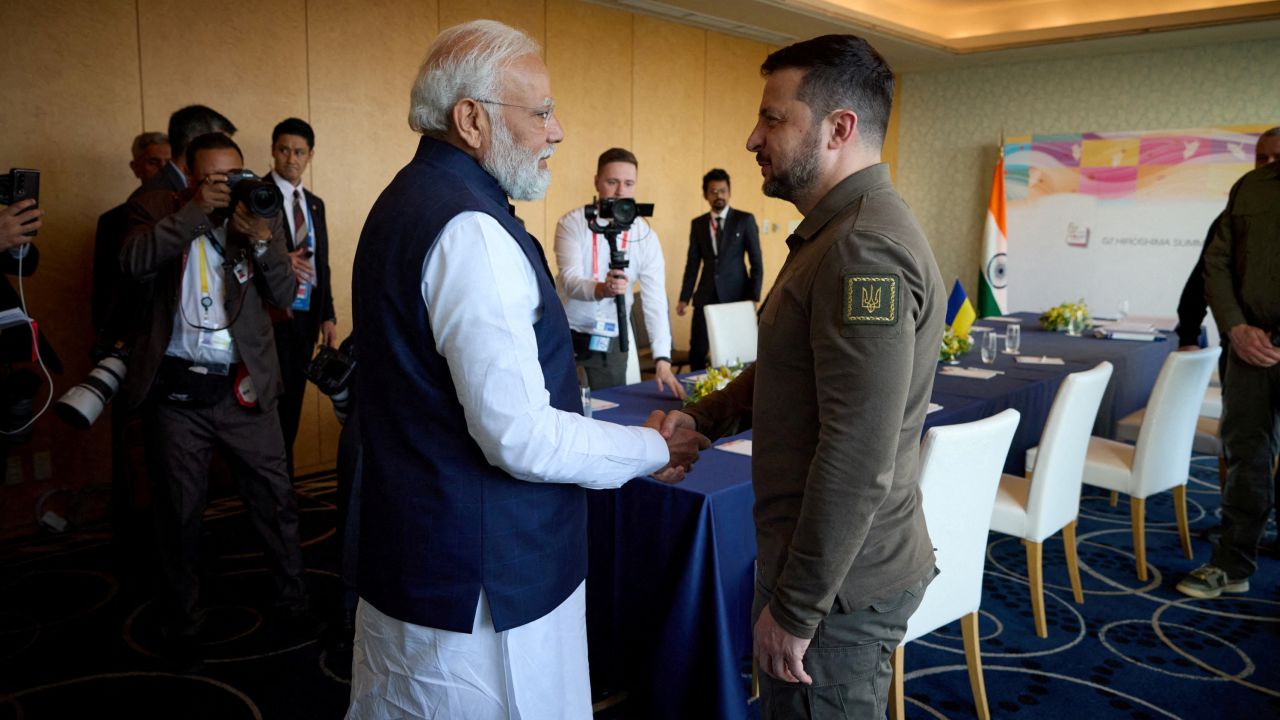
Τη μεσολάβηση του πρωθυπουργού της Ινδίας, Ναρέντρα Μόντι, την επίτευξη της ειρήνης στην Ουκρανία, ζήτησε ο Βολοντίμιρ Ζελένσκι κατά τη διάρκεια της Συνόδου Κορυφής της G7, το Σάββατο 20 Μαΐου 2023.
“Η δημοκρατία χρειάζεται περισσότερα. Νομίζω ότι χρειαζόμαστε σαφή παγκόσμια ηγεσία της Δημοκρατίας. Αυτό είναι το κύριο πράγμα που παρέχουμε με τη συνεργασία μας”, δήλωσε ο Ουκρανός πρόεδρος.
Ο Ζελένσκι κάλεσε τον πρωθυπουργό Ναρέντρα Μόντι να συμμετάσχει στην ουκρανική πρωτοβουλία για τη φόρμουλα ειρήνης και τον ευχαρίστησε επίσης για την υποστήριξη της εδαφικής ακεραιότητας και κυριαρχίας της χώρας.
«Είχα μια συνάντηση με τον Πρωθυπουργό της Ινδίας, Ναρέντρα Μόντι στην Ιαπωνία. Ενημέρωσα λεπτομερώς τον συνομιλητή για την ουκρανική Πρωτοβουλία για την ειρηνευτική φόρμουλα και κάλεσα την Ινδία να συμμετάσχει στην εφαρμογή της. Μίλησα για τις ανάγκες της Ουκρανίας στην ανθρωπιστική αποναρκοθέτηση και τα κινητά νοσοκομεία. Ευχαριστώ την Ινδία για την υποστήριξη της εδαφικής ακεραιότητας και κυριαρχίας της χώρας μας, ιδίως στις πλατφόρμες διεθνών οργανισμών, και για την παροχή ανθρωπιστικής βοήθειας στην Ουκρανία», ανέφερε ο Ουκρανός πρόεδρος στο Twitter.
Στη συνάντηση, ο πρωθυπουργός Μόντι διαβεβαίωσε ότι θα κάνει ό, τι είναι δυνατόν για να βοηθήσει στην επίλυση της σύγκρουσης στην Ουκρανία. Ο Ζελένσκι από την πλευρά του δήλωσε, ότι πιστεύει ότι η Ινδία θα συμμετάσχει στην αποκατάσταση της διεθνούς τάξης που βασίζεται σε κανόνες που χρειάζονται όλα τα ελεύθερα έθνη.
«Ενημέρωσε τον Μόντι σχετικά με την πρόοδο της φόρμουλας ειρήνης μας. Έχουμε ήδη περάσει πολλά στάδια παρουσίασης της φόρμουλας σε ηγέτες και χώρες από διάφορα μέρη του κόσμου. Την ημέρα πριν από την επιτυχή παρουσίαση της φόρμουλας στους συμμετέχοντες στη Σύνοδο Κορυφής του Αραβικού Συνδέσμου. Πιστεύω ότι η Ινδία θα συμμετάσχει στην αποκατάσταση της διεθνούς τάξης που βασίζεται σε κανόνες που χρειάζονται όλα τα ελεύθερα έθνη», ανέφερε ο Ζελένσκι στο Twitter.
H συνάντηση Μόντι-Ζελένσκι ήταν η πρώτη μεταξύ των δύο ηγετών μετά την έναρξη του πολέμου Ρωσίας-Ουκρανίας στις 24 Φεβρουαρίου 2022. Όπως αναφέρουν πηγές, από τότε που ξεκίνησε η σύγκρουση στην Ουκρανία, ο Πρωθυπουργός Μόντι έχει μιλήσει με τον Ρώσο Πρόεδρο, Βλαντιμίρ Πούτιν καθώς και με τον Πρόεδρο Ζελένσκι αρκετές φορές.
Αξίζει να σημειωθεί, ότι το τετ α τετ Μόντι-Ζελένσκι, έγινε πρώτο θέμα στα ιαπωνικά πρωτοσέλιδα, όπως μεταφέρει το ινδικό πρακτορείο ειδήσεων.
-
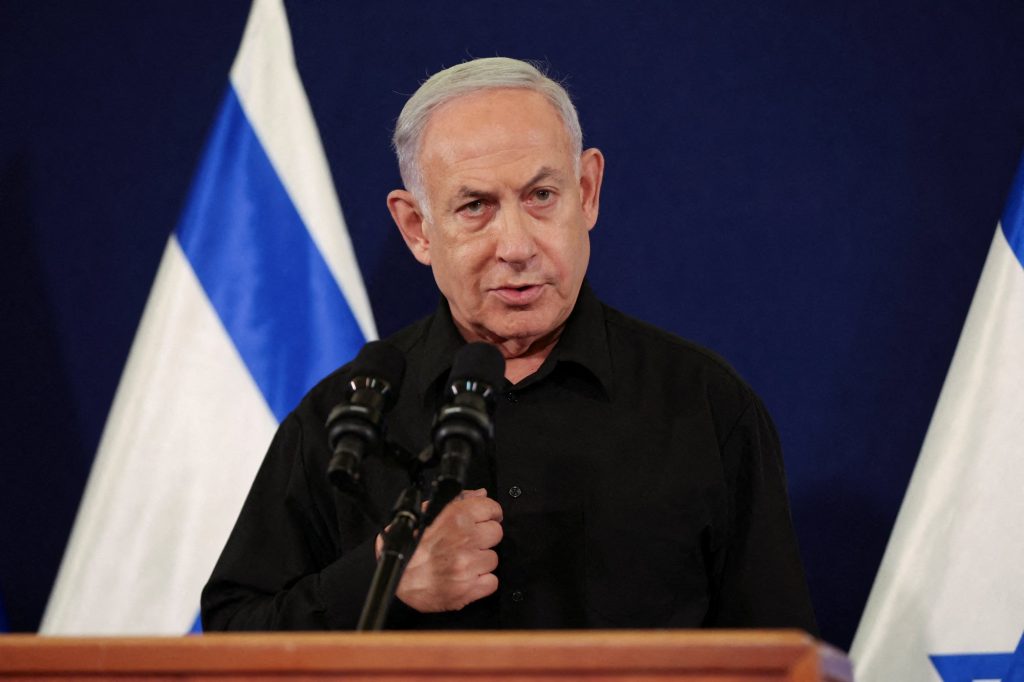
 Ιράν1 ημέρα πριν
Ιράν1 ημέρα πρινKίνηση υψηλού ρίσκου του Ισραήλ! Δεν αποκλείει χτύπημα στα πυρηνικά του Ιράν ο Νετανιάχου – Πότε θα χτυπήσει;
-
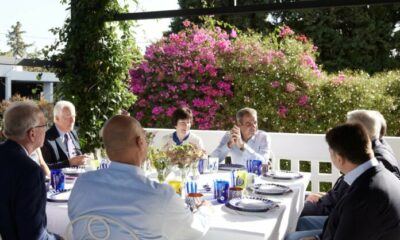
 Εξωτερική Πολιτική1 ημέρα πριν
Εξωτερική Πολιτική1 ημέρα πρινΣτο επίκεντρο η ελληνοαμερικανική συνεργασία σε συνάντηση του Μητσοτάκη με Αμερικανούς γερουσιαστές στα Χανιά
-

 Γενικά θέματα1 ημέρα πριν
Γενικά θέματα1 ημέρα πρινΜία νέα αρχή για το «Γεωπολιτικό»
-
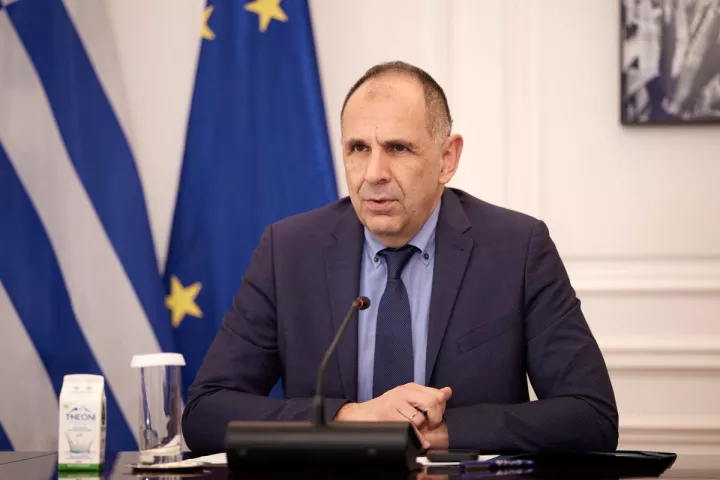
 Αναλύσεις - Γνώμες1 ημέρα πριν
Αναλύσεις - Γνώμες1 ημέρα πρινQuo vadis κύριε Γεραπετρίτη;
-

 Αστυνομία1 ημέρα πριν
Αστυνομία1 ημέρα πρινΑποκάλυψη! Ειδικό λογικό ισραηλινής κατασκευής για μαζική αναγνώριση προσώπων αποκτά η ΕΛ.ΑΣ
-
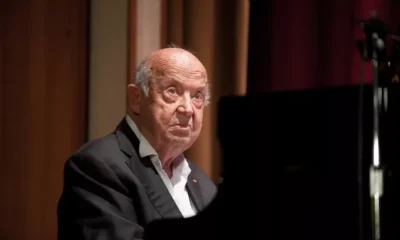
 Πολιτισμός1 ημέρα πριν
Πολιτισμός1 ημέρα πρινΒαθιά σιωπή! Θλίψη και πένθος – Έφυγε ο σπουδαίος Μίμης Πλέσσας λίγο πριν κλείσει τα 100
-

 Video9 ώρες πριν
Video9 ώρες πρινLive: Σε νέα φάση ο πόλεμος στη Μέση Ανατολή! Δύσκολες στιγμές για την ανθρωπότητα
-
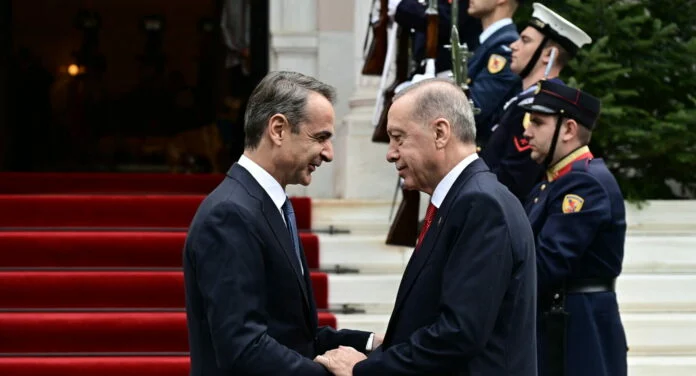
 Γενικά θέματα24 ώρες πριν
Γενικά θέματα24 ώρες πρινΤούρκος διπλωμάτης: «Η σιωπηλή συμφωνία Ερντογάν – Μητσοτάκη»



